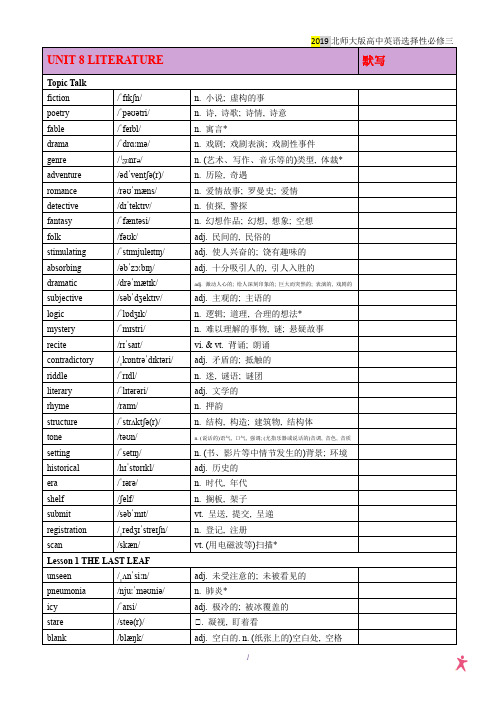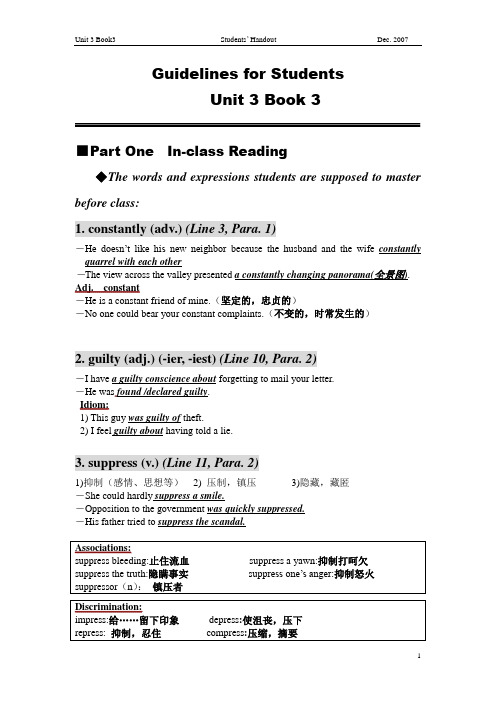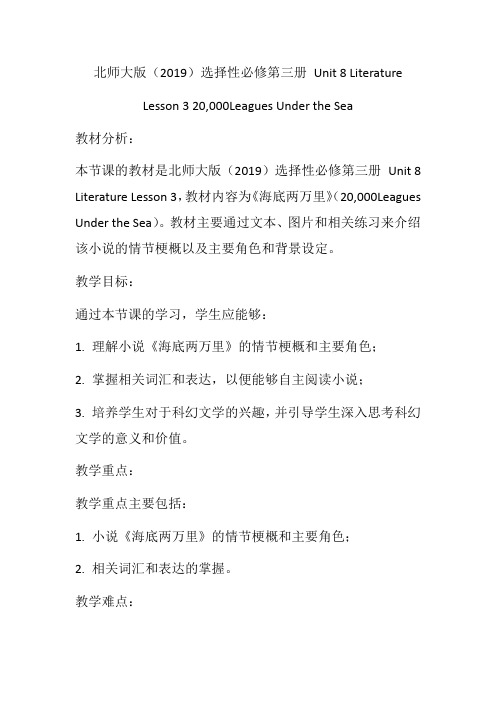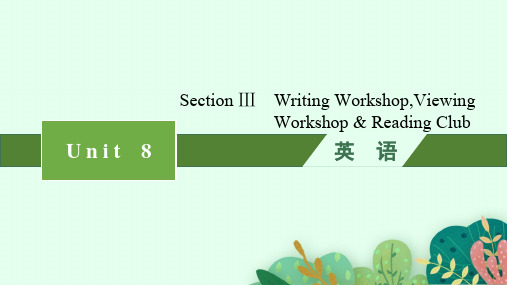高中英语北师大版 Handout for Literature Spot 3 必修三 Frankenstein(学生学案)
北师大2019新版高中英语选择性必修三UNIT 8 LITERATURE 单词表

UNIT 8 LITERATURE默写Topic Talkfiction /ˈfɪkʃn/ n. 小说; 虚构的事poetry /ˈpəʊətri/ n. 诗, 诗歌; 诗情, 诗意fable /ˈfeɪbl/ n. 寓言*drama /ˈdrɑːmə/ n. 戏剧; 戏剧表演; 戏剧性事件genre /ˈʒɒnrə/ n. (艺术、写作、音乐等的)类型, 体裁* adventure /ədˈventʃə(r)/ n. 历险, 奇遇romance /rəʊˈmæns/ n. 爱情故事; 罗曼史; 爱情detective /dɪˈtektɪv/ n. 侦探, 警探fantasy /ˈfæntəsi/ n. 幻想作品; 幻想, 想象; 空想folk /fəʊk/ adj. 民间的, 民俗的stimulating /ˈstɪmjuleɪtɪŋ/ adj. 使人兴奋的; 饶有趣味的absorbing /əbˈzɔːbɪŋ/ adj. 十分吸引人的, 引人入胜的dramatic /drəˈmætɪk/ adj. 激动人心的; 给人深刻印象的; 巨大而突然的; 表演的, 戏剧的subjective /səbˈdʒektɪv/ adj. 主观的; 主语的logic /ˈlɒdʒɪk/ n. 逻辑; 道理, 合理的想法*mystery /ˈmɪstri/ n. 难以理解的事物, 谜; 悬疑故事recite /rɪˈsaɪt/ vi. & vt. 背诵; 朗诵contradictory /ˌkɒntrəˈdɪktəri/ adj. 矛盾的; 抵触的riddle /ˈrɪdl/ n. 迷, 谜语; 谜团literary /ˈlɪtərəri/ adj. 文学的rhyme /raɪm/ n. 押韵structure /ˈstrʌktʃə(r)/ n. 结构, 构造; 建筑物, 结构体tone /təʊn/ n. (说话的)语气, 口气, 强调; (尤指乐器或说话的)音调, 音色, 音质setting /ˈsetɪŋ/ n. (书、影片等中情节发生的)背景; 环境historical /hɪˈstɒrɪkl/ adj. 历史的era /ˈɪərə/ n. 时代, 年代shelf /ʃelf/ n. 搁板, 架子submit /səbˈmɪt/ vt. 呈送, 提交, 呈递registration /ˌredʒɪˈstreɪʃn/ n. 登记, 注册scan /skæn/ vt. (用电磁波等)扫描*Lesson 1 THE LAST LEAFunseen /ˌʌnˈsiːn/ adj. 未受注意的; 未被看见的pneumonia /njuːˈməʊniə/ n. 肺炎*icy /ˈaɪsi/ adj. 极冷的; 被冰覆盖的stare /steə(r)/ ⅵ. 凝视, 盯着看blank /blæŋk/ adj. 空白的. n. (纸张上的)空白处, 空格blanket /ˈblæŋkɪt/ n. 毯子, 毛毯aside /əˈsaɪd/ adv. 到旁边, 在旁边backwards /ˈbækwədz/ adv. 往回, 往前面; 向后, 朝后ivy /ˈaɪvi/ n. 常春藤*vine /vaɪn/ n. 葡萄属植物; 葡萄藤*nonsense /ˈnɒnsns/ n. 胡说, 废话; 荒谬的想法(看法)*sail /seɪl/ ⅵ. & vt. (乘船)航行fetch /fetʃ/ vt. (去)拿来; (去)请来; (去)找来slip /slɪp/ vi. 溜走, 悄悄地走; 滑倒disbelief /ˌdɪsbɪˈliːf/ n. 不信, 怀疑curtain /ˈkɜːtn/ n. 窗帘; 门帘; 帘子crime /kraɪm/ n. 罪, 罪行; 犯罪活动fellow /ˈfeləʊ/ n. 男人; 家伙janitor /ˈdʒænɪtə(r)/ n. (学校或大楼的)看门人, 门房, 管理员* clothing /ˈkləʊðɪŋ/ n. 服装, 衣服inch /ɪntʃ/ n. 英寸Lesson 2 POETRYqueer /kwɪə(r)/ adj. 奇怪的, 难以解释的*frozen /ˈfrəʊzn/ adj. (河、湖等)结冰的; 冷冻的, 冷藏的harness /ˈhɑːnɪs/ n. (马的)挽具, 马具*sweep /swiːp/ vt. & vi. 扫, 打扫; 扫去; 卷走, 冲走downy /ˈdaʊni/ adj. 被绒毛覆盖的; 充满绒毛的*flake /fleɪk/ n. 小薄片*daffodil /ˈdæfədɪl/ n. 水仙(花), 黄水仙*wander /ˈwɒndə(r)/ ⅵ. & vt. 徘徊, 闲逛; 漫步于vale /veɪl/ n. 谷; 山谷*flutter /ˈflʌtə(r)/ vi. & vt. (在空中)飘扬, 飘动; 振(翼), 拍打(翅膀) * breeze /briːz/ n. 微风, 和风*continuous /kənˈtɪnjuəs/ adj. 持续的, 不间断的, 连续的twinkle /ˈtwɪŋkl/ ⅵ. 闪烁, 闪耀*stretch /stretʃ/ vi. & vt. 延伸, 绵延; (使)变大; (使)变松; 拉长margin /ˈmɑːdʒɪn/ n. (尤指地域或水域的)边缘, 边隅; 页边的空白, 页边bay /beɪ/ n. 湾, 海湾glance /ɡlɑːns/ n. 一瞥, 很快的一看. ⅵ. 一瞥, 看一眼* toss /tɒs/ vi. & vt. 甩头; 扔, 掷, 抛sprightly /ˈspraɪtli/ adj. 活跃的, 充满活力的*wave /weɪv/ n. 海浪, 波涛; (行为、活动或感情的)一阵, 风潮. vi. & vt. 挥动, 摆动; 挥手sparkling /ˈspɑːklɪŋ/ adj. 闪亮的, 闪光的*glee /ɡliː/ n. 高兴, 兴奋; 幸灾乐祸*poet /ˈpəʊɪt/ n. 诗人gay /ɡeɪ/ adj. 快乐的, 兴奋的*jocund /ˈdʒɒkənd/ adj. 快活的; 高兴的*gaze /ɡeɪz/ ⅵ. & n. 凝视, 盯着看; 注视*oft /ɒft/ adv. 经常, 时常*couch /kaʊtʃ/ n. 长沙发vacant /ˈveɪkənt/ adj. 空的, 未被占用的*pensive /ˈpensɪv/ adj. 沉思的; 郁郁不乐的*inward /ˈɪnwəd/ adj. 内心的, 精神的bliss /blɪs/ n. 极乐, 无上幸福, 福佑, 至福* solitude /ˈsɒlətjuːd/ n. 独处, 独居Lesson 3 20,000 LEAGUES UNDER THE SEAleague /liːɡ/ n. 里格(=3英里或3海里); 体育运动联合会, 联赛; 联盟, 同盟violent /ˈvaɪələnt/ adj. 强烈的; 暴力的, 强暴的recollection /ˌrekəˈlekʃn/ n. 想起, 记起*desperation /ˌdespəˈreɪʃn/ n. 绝望; 拼命, 不顾一切sink /sɪŋk/ vi. & vt. 下沉, 沉没ease /iːz/ n. 轻易, 毫不费劲grab /ɡræb/ vt. 攫取, 抓住nevertheless /ˌnevəðəˈles/ adv. 然而, 不过; 尽管如此preservation /ˌprezəˈveɪʃn/ n. 维护; 保护; 保持, 维持; 保存drown /draʊn/ vi. & vt. (使)淹死, (使)湖毙*strike /straɪk/ vi. & vt. 打, 击, 撞; 突然发生不幸; n. 罢工; 打击chest /tʃest/ n. 胸部, 胸膛unconscious /ʌnˈkɒnʃəs/ adj. 不省人事的, 失去知觉的being /ˈbiːɪŋ/ n. 生物(尤指人); 诞生; 出现; 存在whale /weɪl/ n. 鲸weapon /ˈwepən/ n. 武器, 兵器; 凶器bounce /baʊns/ vi. & vt. (使)弹起, (使)反弹steel /stiːl/ n. 钢, 钢铁evidently /ˈevɪdəntli/ adv. 明显地, 显然solid /ˈsɒlɪd/ adj. 固体的; 坚硬的polished /ˈpɒlɪʃt/ adj. 擦亮的, 磨光的; 精湛的; 精致的construction /kənˈstrʌkʃn/ n. 建筑物; 建造物; 建造, 建筑daybreak /ˈdeɪbreɪk/ n. 黎明, 破晓utter /ˈʌtə(r)/ vt. (尤指吃力地)发出(声音) *Writing Workshop A CONTINUATION OF A STORYcontinuation /kənˌtɪnjuˈeɪʃn/ n. 延续, 继续部分aboard /əˈbɔːd/ prep. & adv. 在(船, 飞机, 火车)上; 上(船, 飞机, 火车)seaman /ˈsiːmən/ n. 水手, 海员; 水兵comfort /ˈkʌmfət/ vt. 安慰, 抚慰; n. 舒适感, 满足感take…for granted 视……为理所当然(而对其不重视)Reading Club 1emotional /ɪˈməʊʃənl/ adj. 情绪的, 情感敏感的; 情绪微动的scholar /ˈskɒlə(r)/ n. 有学问的人; 学者Reading Club 2poison /ˈpɔɪzn/ n. 毒药, 毒素, 毒物; vt. 毒害, 毒杀forgive /fəˈɡɪv/ vi. & vt. 原谅, 宽恕, 饶恕fence /fens/ n. 栅栏, 围栏, 篱笆handkerchief /ˈhæŋkətʃɪf/ n. 手帕noble /ˈnəʊbl/ adj. 高尚的, 崇高的; 贵族的说明:带*号的词为《普通高中英语课程标准(2017年版)》必修和选择性必修以外词汇。
北师大版高中英语选择性必修3 UNIT 8 LITERATURE

美文导入
核心素养目标
英语 选择性 必修第三册 配北师大版
UNIT 8 LITERATURE
anniversary /ˌænɪˈvɜːsəri/ n. 周年纪念日 emotion /ɪˈməʊʃn/ n. 情感;情绪 reproduce /ˌriːprəˈdjuːs/ vt. 复制;再现……的声音或画面 portrait /ˈpɔːtreɪt/ n. 肖像
美文导入
核心素养目标
英语 选择性 必修第三册 配北师大版
UNIT 8 LITERATURE
核心素养目标
美文导入
核心素养目标
英语 选择性 必修第三册 配北师大版
【语言技能】 学会写一篇读后续写; 掌握重点词汇和句式; 学习状态动词和动作动词的用法; 学会理解诗歌的含义。
UNIT 8 LITERATURE
UNIT 8 LITERATURE
英语 选择性 必修第三册 配北师大版
UNIT 8 LITERATURE
美文导入
美文导入
核心素养目标
英语 选择性 必修第三册 配北师大版
UNIT 8 LITERATURE
素养解读:主题语境是英语学科素养的基础,而人与社会
又是主题语境下的一个子主题。本单元的话题“文学”就属于
美文导入
核心素养目标
英语 选择性 必修第三册 配北师大版
UNIT 8 LITERATURE
Van Gogh was the son of the mister. He left school when he was just 15.By the age of 27, he had already tried many jobs including an art gallery salesman and a French teacher. Finally in 1880, he decided to begin his studies in art.
Handout-Book3-Unit3

Guidelines for StudentsUnit 3 Book 3■Part One In-class Reading◆The words and expressions students are supposed to master before class:1. constantly (adv.) (Line 3, Para. 1)-He doesn’t like his new neighbor because the husband and the wife constantly quarrel with each other-The view across the valley presented a constantly changing panorama(全景图). Adj. constant-He is a constant friend of mine.(坚定的,忠贞的)-No one could bear your constant complaints.(不变的,时常发生的)2. guilty (adj.) (-ier, -iest) (Line 10, Para. 2)-I have a guilty conscience about forgetting to mail your letter.-He was found /declared guilty.Idiom:1) This guy was guilty of theft.2) I feel guilty about having told a lie.3. suppress (v.) (Line 11, Para. 2)1)抑制(感情、思想等)2) 压制,镇压3)隐藏,藏匿-She could hardly suppress a smile.-Opposition to the government was quickly suppressed.-His father tried to suppress the scandal.4. resentful (adj.) (Line 15, Para. 3)-He was deeply resentful at her interference.-She gave her husband a resentful look.v. resent: resent sth./ doing sth./ that…(对……表示忿恨)n. resentment 忿恨(Line 40, Para. 6)5. range (in sth.) from ... to …(Line 21, Para. 4)-The children’s ages range from 5 to 10 / between 5 and 10.-His feelings to this failure have ranged from bitterness to hope.6. foster (v.) (Line 28, Para. 5)1) 培养,促进2) 抚养,养育-I The couple wanted to adopt the black child they had been fostering.-She has since gone on to find happiness by fostering more than 100 children.-We hope these meetings will help foster friendly relations between our two countries.-These sessions are designed to foster better working relationships.7. stimulate (v.) (Line29, Para. 5)1)刺激,使兴奋2) 鼓励-Exercise stimulates the body.-The approach of the 2008 Olympic Games stimulated Chinese people’s zeal for8. compel(v/n) (Line 54, Para. 7)-They submitted because they were compelled.-His cleverness and skill compel our admiration.-Her illness compelled her to give up his studies.adj. compelling:使人非注意不可的-My second and more compelling reason for going to Dearborn was to see the Henry Ford Museum.-The court was presented with compelling evidence that she'd murdered her husband.9. optimum(Line56 Para7)10. accessibility (Line 62, Para. 8)access →accessible →accessibility-The only access to their house is along a narrow road.-Students need easy access to books.-The island is accessible only by boat.-The problem with some of these drugs is that they are so very accessible.-Two new roads are being built to increase accessibility to the town centre.-The accessibility of her plays (= the fact that they can be understood) means that she is able to reach a wide audience.11. supreme (Line62,Para8) 1) 最高位的2) 极度的;至上的-The matter will have to be decided by the Supreme Court.-Love brings him the supreme courage.-Technology is to the development of the modern society a matter of supreme importance.12. basis(Line 21,Para4) 【Pl】:bases-A steady process in economy is supposed to establish/lay a basis for the construction of a Harmonious Society.-On the basis of these facts, we can reach the following conclusion.13. concern(Line59,Para8)1) “挂念,担心”,不可数名词,后接about/for-I feel no concern about the matter.2) “关系,利害关系” concern后接with/in-I have no concern with the matter.14. arise v.(Line66,Para8)(arose, arisen)1.出现, 产生-The birds also attack crops when the opportunity arises.-Problems arose over plans to build a new supermarket here.2.由……引起, 起源于-Are there any matters arising from the last meeting?-The board acknowledges the problems which arise from the newness of the 15. expense n(Line2,Para1).1) “花费,费用”,常为不可数-household expense 家庭支出;public expense 公费;2)具体的“花一笔钱”或“费用,津贴”多为可数16. invaluable adj (Line65,Para8).注:invaluable不是valuable的反义词,而是priceless的同义词1) 注意区分invaluable和pricelessinvaluable意为“珍贵的”,多指质地上是非常宝贵的,也可对实际无法计价的事物进行修饰;be invaluable to…Their services were invaluable to me.priceless意为“极贵重的,无价的”,Is this dress priceless?17. necessity n(Line52,Para7). “必要性”:为不可数名词。
高中英语北师大版必修1《Literature Spot 1 A Christmas Carol》优质课教案省级比赛获奖教案公开课试讲教案

高中英语北师大版必修1《Literature Spot 1 A Christmas Carol》优质课教案省级比赛获奖教案公开课教师面试试讲教案(名师授课教案)1教学目标1.知识目标:能够掌握描述Scrooge的词汇如:generous,cruel,impolite,polite,friendly,mean,selfish, kind等; 2.能力目标:(1)能够通过浏览、查读和细读等阅读技巧欣赏英语文学作品《圣诞颂歌》,并提高逻辑思维能力。
(2)能通过细读文本,分析Scrooge语言、动作等的描写来解读Scrooge的性格特点,提高批判性思维能力。
(3)能通过勾画思维导图,复述Scrooge前后变化的主要内容,挖掘本文寓意(generosity),提升主题(Love),发展创造性思维和文化性思维能力。
3.情感目标:(1)能通过讨论文本寓意,养成向善、大方、关爱他人、乐于助人等生活态度。
(2)提升对外国文学作品的阅读兴趣及欣赏能力。
2学情分析大部分学生在进行英语阅读时已初步掌握和使用一些有效的阅读策略,如略读、跳读、精读、推理、判断等。
在平时的教学中,大部分学生表现出了较强的合作学习的愿望,在讨论中学生会真实地提出自己的困惑、见解,并愿意分享自己的学习成果。
此外,教师在平时的英语阅读教学中也常引导学生勾画思维导图,所以大部分学生已经能自己勾画思维导图辅助英语阅读。
但是他们对文学作品的涉猎很少,还没完全掌握欣赏文学作品的策略和能力。
3重点难点教学重点:(1)通过预测、略读和细读等阅读技巧来读懂《圣诞颂歌》的主要内容。
(2)通过勾画思维导图,复述Scrooge的前后变化,挖掘文本寓意。
教学难点:借助思维导图,分析Scrooge的性格、心理、行为转变并提升小说主题。
(Love)4教学过程。
Unit8LiteratureLesson3高二下学期英语北师大版选择性

北师大版(2019)选择性必修第三册Unit 8 LiteratureLesson 3 20,000Leagues Under the Sea教材分析:本节课的教材是北师大版(2019)选择性必修第三册Unit 8 Literature Lesson 3,教材内容为《海底两万里》(20,000Leagues Under the Sea)。
教材主要通过文本、图片和相关练习来介绍该小说的情节梗概以及主要角色和背景设定。
教学目标:通过本节课的学习,学生应能够:1. 理解小说《海底两万里》的情节梗概和主要角色;2. 掌握相关词汇和表达,以便能够自主阅读小说;3. 培养学生对于科幻文学的兴趣,并引导学生深入思考科幻文学的意义和价值。
教学重点:教学重点主要包括:1. 小说《海底两万里》的情节梗概和主要角色;2. 相关词汇和表达的掌握。
教学难点:教学难点主要包括:1. 长篇小说的情节和主要角色的理解;2. 科幻文学的意义和价值的引导。
学情分析:学生为高二的学生,他们已经学习了英语基础知识,并具备一定的阅读能力和理解能力。
然而,学生对于长篇小说的阅读和理解可能存在一定困难,对于科幻文学的兴趣和了解也相对较少。
教学策略:针对以上学情分析,可采取以下教学策略:1. 激发学生的学习兴趣,提前通过以图片、视频等形式引入小说的情节和背景,让学生建立起对小说的初步认知,培养学生对于科幻文学的兴趣;2. 通过课堂互动和小组活动等形式,让学生积极参与,提高课堂氛围,激发学生学习英语的兴趣;3. 提供有针对性的阅读材料和练习,帮助学生巩固所学知识,提高阅读理解能力。
教学方法:教学方法包括:1. 集体讨论,通过问题引导学生思考和讨论,激发他们的思维;2. 小组活动,让学生分组合作,共同完成任务,培养学生的合作意识和团队精神;3. 阅读训练,通过阅读材料和相关练习培养学生的阅读理解能力。
导入环节(约5分钟):教学内容:引导学生了解《海底两万里》的背景和作者。
北师大版高中英语同步测控选择性必修第三册精品课件UNIt 8 Literature SectionⅢ

【合作探究】 记一记·长知识
【即学即用】
单句语法填空
①This lesson is a continuation (continue) of our last lesson.
②The rain continued to fall/falling (fall) all afternoon.
完成句子
Unit 8
Section Ⅲ Writing Workshop,Viewing Workshop & Reading Club
英语
内容索引
走近新课·一起读文 阅读鉴赏·一起思考
走近新课·一起读文
词汇新知
一、单词英汉互译
1.seaman /̍siːmən/n. 水手,海员;水兵
2.fence /fens/ vi. 击剑
The first step is to go exploring,if you’re out of your comfort zone or if you’re wandering into somebody’s house for the first time. 如果你走出舒适区或者如果你第一次走进别人的房子,那么第一步就是去 探索。
③她连续不断地受雇于人,一直工作到65岁。
She was in
continuous employment until the age of 65.
2.We were aboard the machine now,and I shook with cold in the darkness.(Page 40) 我们现在在机器上,我在黑暗中冷得发抖。 ★aboard prep.& adv.在(船,飞机,火车)上;上(船,飞机,火车) They finally went aboard the plane. 他们终于登上了飞机。
Unit 8 Literature L2 Poetry 高中英语北师大版(2019)选择性必修第三册

What is the effect of the repetition in the last lines of the poem?
P34 6
The writer repeats the last line to show how sad the speaker feels. He cannot stop and must continue on his long journey.
That is newly spring in June;
And the rocks melt with the sun;
O, my love is like the melody,
And I will love you still, my dear,
That is sweetly played in tune. often inWhile the sands of life shall run.
1. Why did the writer stop by the woods? He wanted to watch the snow falling in the woods.
2. Why did the horse give the harness bells a shake? The horse was unsure why they had stopped without a farmhouse nearby.
3. Why couldn't the writer stay longer in the woods?
The writer couldn't stay because he needed to keep going on his journey and he had many more miles left to travel.
必修三 Frankenstein学案-最新教育文档

Handout for Literature Spot 3FrankensteinEx. 1 Listen and read the text carefully and do True or False exercises.()1. Frankenstein was very interested in science.()2. Frankenstein was pleased with his creation.()3. Justine was accused of murdering William and was hanged.()4. The monster hated people as soon as he was created.()5. Frankenstein created the female monster but destroyed her at last.()6. The police accused Frankenstein of murdering Henry.()7. The monster killed Frankenstein’s wife and escaped.()8. In the end, the ship’s captain killed the monster.Ex. 2 Make clear the relations between Victor Frankenstein and other characters. Ex. 3 The story is told by three people, that is, there are three narrators(叙述者). Order the five parts of the story.Ex. 4Ex. 5s ___________(奋斗)to realize his dream, working day and night for two years and used parts of bodies to create the monster. However, the monster killed the people closest to him and d___________ his life.As for the monster, he was a___________ the moment he was created. He had to w_________(流浪)from place to place aimlessly. At first he showed kindness to people, but was treated badly. So he decided to r___________(报复)his creator Frankenstein.1.Describe Frankenstein, using at least three adjectives. Give your supporting evidence.2.Describe the monster, using at least three adjectives. Give your supporting evidence.Ex.6 Creative writing1.以“Frankenstein in my eyes(我眼中的弗兰肯斯坦)”为题,用英语创意表达,并设计插图2.以“The monster in my eyes(我眼中的怪物)”为题,用英语创意表达,并设计插图Ex.7 Extending reading:《弗兰肯斯坦》书虫版、《弗兰肯斯坦》典范英语版第 1 页。
- 1、下载文档前请自行甄别文档内容的完整性,平台不提供额外的编辑、内容补充、找答案等附加服务。
- 2、"仅部分预览"的文档,不可在线预览部分如存在完整性等问题,可反馈申请退款(可完整预览的文档不适用该条件!)。
- 3、如文档侵犯您的权益,请联系客服反馈,我们会尽快为您处理(人工客服工作时间:9:00-18:30)。
Handout for Literature Spot 3
Frankenstein
Ex. 1 Listen and read the text carefully and do True or False exercises.
( )1. Frankenstein was very interested in science.
( )2. Frankenstein was pleased with his creation.
( )3. Justine was accused of murdering William and was hanged.
( )4. The monster hated people as soon as he was created.
( )5. Frankenstein created the female monster but destroyed her at last.
( )6. The police accused Frankenstein of murdering Henry.
( )7. The monster killed Frankenstein ’s wife and escaped.
( )8. In the end, the ship ’s captain killed the monster.
Ex. 3 The story is told by three people, that is, there are three narrators (叙述者). Order the five parts of the story .
Monster Ernest & William The Relations between Victor Frankenstein and other characters Victor Frankenstein Henry Clerval Justine Elizabeth Captain Walton
Ex. 4 Answer these questions:
Q1: Why did Frankenstein create the monster?
Q2: What did Frankenstein do to the monster?
Q3: Why and how did the monster destroy Fra nkenstein’s life?
Ex. 5 Describe Frankenstein and the monster
Frankenstein was very interested in science and he d___________ of creating new life. He
s ___________(奋斗)to realize his dream, working day and night for two years and used parts of bodies to create the monster. However, the monster killed the people closest to him and d___________ his life.
As for the monster, he was a___________ the moment he was created. He had to w_________(流浪)from place to place aimlessly. At first he showed kindness to people, but was treated badly. So he decided to r___________(报复)his creator Frankenstein.
1.Describe Frankenstein, using at least three adjectives. Give your supporting evidence.
2.Describe the monster, using at least three adjectives. Give your supporting evidence.
Ex.6 Creative writing
1.以“Frankenstein in my eyes(我眼中的弗兰肯斯坦)”为题,用英语创意表达,并设计插图
2.以“The monster in my eyes(我眼中的怪物)”为题,用英语创意表达,并设计插图Ex.7 Extending reading:《弗兰肯斯坦》书虫版、《弗兰肯斯坦》典范英语版。
